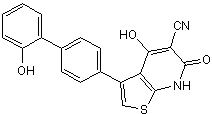A 769662
Chemical Name: 6,7-Dihydro-4-hydroxy-3-(2'-hydroxy[1,1'-biphenyl]-4-yl)-6-oxo-thieno[2,3-b]pyridine-5-carbonitrile
Purity: ≥98%
Biological Activity
A 769662 is a potent, reversible AMP-activated protein kinase (AMPK) activator (EC50 = 0.8 μM) that displays selectivity towards β1 subunit-containing heterotrimers. Inhibits fatty acid synthesis (IC50 = 3.2 μM) and decreases plasma glucose and triglyceride levels in vivo. Also inhibits proliferation of mesenchymal stem cells, and impedes reprogramming of mouse embryonic fibroblasts to iPSCs. Activates autophagy.Technical Data
The technical data provided above is for guidance only.
For batch specific data refer to the Certificate of Analysis.
Tocris products are intended for laboratory research use only, unless stated otherwise.
Background References
-
Role of AMP-activated protein kinase in regulating hypoxic survival and proliferation of mesenchymal stem cells.
de Meester et al.
Cardiovasc.Res., 2014;101:20 -
Pharmacological modulation of autophagy: therapeutic potential and persisting obstacles.
Galluzzi et al.
Nat.Rev.Drug.Discov., 2017; -
Activation of AMP-activated protein kinase (AMPK) provides a metabolic barrier to reprogramming somatic cells into stem cells.
Vazquez-Martin et al.
Cell Cycle, 2012;5:974 -
MetF. activates a duodenal Ampk-dependent pathway to lower hepatic glucose production in rats.
Duca et al.
Nat.Med., 2015;21:506 -
Defining the mechanism of activation of AMP-activated protein kinase by the small molecule A-769662, a member of the thienopyridone family.
Sanders et al.
J.Biol.Chem., 2007;282:32539 -
Thienopyridone drugs are selective activators of AMP-activated protein kinase β1-containing complexes.
Scott et al.
Chem.Biol., 2008;15:1220 -
Identification and characterization of a small molecule AMPK activator that treats key components of type 2 diabetes and the metabolic syndrome.
Cool et al.
Cell Met., 2006;3:403
Product Datasheets
Reconstitution Calculator
Molarity Calculator
Citations for A 769662
The citations listed below are publications that use Tocris products. Selected citations for A 769662 include:
24 Citations: Showing 1 - 10
-
Investigation of the specificity and mechanism of action of the ULK1/AMPK inhibitor SBI-0206965.
Authors: Ahwazi Et al.
Biochem J 2021;478:2977
-
AMPK activation regulates P-body dynamics in mouse sensory neurons in vitro and in vivo.
Authors: Paige Et al.
Neurobiol Pain 2019;5
-
Peroxisome Proliferator-Activated Receptor α Agonist and Its Target Nanog Cooperate to Induce Pluripotency.
Authors: Lee Et al.
J Clin Med 2018;7
-
Phosphorylation of Cytochrome c Threonine 28 Regulates Electron Transport Chain Activity in Kidney: IMPLICATIONS FOR AMP KINASE.
Authors: Mahapatra Et al.
J Biol Chem 2017;292:64
-
Entosis Is Induced by Glucose Starvation.
Authors: Hamann Et al.
Cell Rep 2017;20:201
-
Methyl-β-cyclodextrin restores impaired autophagy flux in Niemann-Pick C1-deficient cells through activation of AMPK.
Authors: Dai Et al.
Autophagy 2017;13:1435
-
AMP-activated protein kinase activator A-769662 increases intracellular calcium and ATP release from astrocytes in an AMPK-independent manner.
Authors: Vlachaki Walker Et al.
Diabetes Obes.Metab. 2017;
-
mTOR controls lysosome tubulation and antigen presentation in macrophages and dendritic cells.
Authors: Saric Et al.
Arterioscler Thromb Vasc Biol 2016;27:321
-
Killer Cell Lectin-like Receptor G1 Inhibits NK Cell Function through Activation of Adenosine 5'-Monophosphate-Activated Protein Kinase.
Authors: M?ller-Durovic Et al.
J Immunol 2016;197:2891
-
Activation of AMPK-induced autophagy ameliorates Huntington disease pathology in vitro.
Authors: Walter Et al.
Neuropharmacology 2016;108:24
-
Intact LKB1 activity is required for survival of dormant ovarian cancer spheroids.
Authors: Peart Et al.
Oncotarget 2015;6:22424
-
Enhanced Production of Adenosine Triphosphate by Pharmacological Activation of Adenosine Monophosphate-Activated Protein Kinase Ameliorates Acetaminophen-Induced Liver Injury.
Authors: Hwang Et al.
J Pharmacol Exp Ther 2015;38:843
-
Dynamics of elongation factor 2 kinase regulation in cortical neurons in response to synaptic activity.
Authors: Kenney Et al.
J Neurosci 2015;35:3034
-
Glucose and palmitate uncouple AMPK from autophagy in human aortic endothelial cells.
Authors: Weikel Et al.
Am J Physiol Cell Physiol 2015;308:C249
-
A novel MEK-ERK-AMPK signaling axis controls chemokine receptor CCR7-dependent survival in human mature dendritic cells.
Authors: López-Cotarelo Et al.
Mol Cell 2015;290:827
-
Cellular energy stress induces AMPK-mediated regulation of YAP and the Hippo pathway.
Authors: Mo Et al.
Nat Cell Biol 2015;17:500
-
Bidirectional regulation of P body formation mediated by eIF4F complex formation in sensory neurons.
Authors: Melemedjian Et al.
Neurosci Lett 2014;563:169
-
AMPK-dependent degradation of TXNIP upon energy stress leads to enhanced glucose uptake via GLUT1.
Authors: Wu Et al.
Arthritis Rheum 2013;49:1167
-
AMPK-dependent phosphorylation of ULK1 regulates ATG9 localization.
Authors: Mack Et al.
Autophagy 2012;8:1197
-
Lkb1 regulates organogenesis and early oncogenesis along AMPK-dependent and -independent pathways.
Authors: Lo Et al.
J Cell Biol 2012;199:1117
-
Chondrocyte AMP-activated protein kinase activity suppresses matrix degradation responses to proinflammatory cytokines interleukin-1β and tumor necrosis factor α.
Authors: Terkeltaub Et al.
Proc Natl Acad Sci U S A 2011;63:1928
-
5-Aminoimidazole-4-carboxyamide-ribonucleoside (AICAR)-stimulated hepatic expression of Cyp4a10, Cyp4a14, Cyp4a31, and other peroxisome proliferator-activated receptor α-responsive mouse genes is AICAR 5'-monophosphate-dependent and AMP-activated
Authors: Bumpus and Johnson
J Biol Chem 2011;339:886
-
AMP-activated protein kinase suppresses endothelial cell inflammation through phosphorylation of transcriptional coactivator p300.
Authors: Zhang Et al.
Mol Cells 2011;31:2897
-
Enhancing AMPK activation during ischemia protects the diabetic heart against reperfusion injury.
Authors: Paiva Et al.
Am J Physiol Heart Circ Physiol 2011;300:H2123
FAQs
No product specific FAQs exist for this product, however you may
View all Small Molecule FAQsReviews for A 769662
There are currently no reviews for this product. Be the first to review A 769662 and earn rewards!
Have you used A 769662?
Submit a review and receive an Amazon gift card.
$25/€18/£15/$25CAN/¥75 Yuan/¥2500 Yen for a review with an image
$10/€7/£6/$10 CAD/¥70 Yuan/¥1110 Yen for a review without an image

